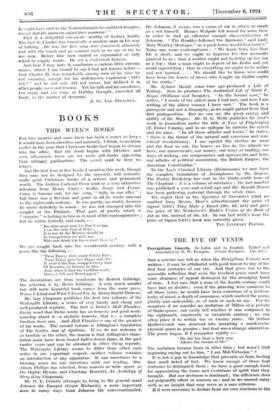BOOKS
THIS WEEK'S BOOKS
FOR two months and more there has been a secret to keep : it would have been cheerless and untimely, I think, to mention earlier in the year that Christmas books had begun to stream
into the office. But the flood begins with October, and soon afterwards there are far more gift-books appearing
than ordinary publications. The secret need -be -kept no
longer.
And the first four or five books I mention this week, though they may not be designed for the occasion, will certainly make good Christmas books of a serious and permanent worth. The Golden Cockerel Press send us a very attractive selection from Henry Carey's works, Songs and Poems. Carey is famous only for one song, " Sally in our alley " ; but there was a freedom and grace in all,he wrote unusual to the eighteenth century. It was partly, no doubt, because he wrote definitely to music ; he was not cramped .into the couplet .or the Pindaric. That part of poetry which is " surprise " is lacking in him as in most of his contemporaries ; but he writes lyrically and easily :—
"Baechus.must now his Pow•'r resign,
I am the only God of Wine : It is not fit the Wretch should be In Competition set with me, Who can drink ten times more than he."
- We are caught back into the seventeenth century with a poem like the following :— " 'Tyres Fancy, first, made Coelia Fair : 'Twas Fancy. gave her Shape and Air. It robb'd the Sun, stripp'd every Star Of Beauties, to bestow on Her.
And, when it had the Goddess made, Down it fell and Worshipped."
The decorations are from wood-cuts by Robert -Gibbings, the selection is I.)y Moira Gibbings. A very much smaller but still more beautiful book comes from the -same press
Tl'here I Lived and What I Lived For, by Henry David-Thoreau: Mr. Guy Chapman publishes the first two volumes of the
Watergate Library, a series of very bandy and cheap and well-produced reprints. The first is Defoe's Moll Flanders.
Every word that Defoe wrote has an honesty and good work- manship shout it—a stylistic honesty, that is ; a -complete freedom from airs. And Moll Flanders is one of the greatest of his works. The second volume is Adlington's translation
of The Golden Asse of Apuleius. If we do not welcome it as heartily as the other, -the reason is that Adlington's tram- lation must--have-been- issued ludfo-dozen times _in the past twelve years and can -be obtained in other cheap reprints.
--The Watergate Library seems to -differ from other such -series in one i important respect—neither volume contains
an introduction or any apparatus. It can. sometimes be a blessing -when no one interferes with our reading. Mrs.
Alison Phillips has selected, from sources-as -wide apart -as the Orptrie- Hymns and Christina Rossetti, An Anthology of
Sleep (Guy Chapman.).
Mr. 0. F. Christie attempts to bring to the general mind Johnson .the Essayist -(Grant Richards), a more important man in many ways than Johnson the conversationalist.
Dr. Johnson, it seems, was a cause of wit in others as-much as a wit himself. Horace -Walpole felt round- for some time in order to find an offensive enough characterization of Johnson. " The Rambler-followed the Spectator,",said Lady Mary Wortley-Montagu, " as a pack-horse would do a hunter." TaMe was more 'contemptuous " We learn from him that life is short, and we ought -to -improve the :-few moments granted to us ; that a mother ought not to .bring up her son as a fop ; that a man ought to repent- of his faults and -yet avoid superstition ; that in everything we ought to be active and not hurried. . . . We should like to know who could have been the lovers of ennui who bought up 13,000 copies of his --works."
Mr. Aylmer Maude . some time ago. produced a Life of -Tolstoy. Now he- produces The Authorized Life of Marie C. Slopes (Williams and Norgate). " In the former ease," he writes, " I wrote of the ablest man I had met, and now I am writing of the ablest woman I have met." :The book is a panegyric. and not a biogutpliy,.aswe might gather from that first juxtaposition. But we can see the -great energy and ability of Dr. Stopes. . Mr. H. G. Wells publishes his year's work in journalism under the title A Year of Prophesying (T. Fisher Unwin), and in an epilogue he surveys his career and his aims. " In all these articles and books," he states, " there is the thrust of the natural and conscious and con- vinced revolutionary. I am against the clothes we wear and the food we eat, the houses we live- in, the schools we have, our amusements, our money, our -ways of trading, our ways of making, our compromises and agreements and laws, our articles of political association, the British Empire, the American Constitution."
In the Loeb Classical Library (Heinemann) we now have the complete translation of Aristophanes by Dr. Rogers. The Poetry Bookshop has sent us the thirty-ninth •issue• of The Chapbook : it is:a volume of substance.; the last slumber was published a year and a-half ego and Mr. Harold Monro has been gathering material through the whole time.
We regret that in the Spectator of November 22nd. we omitted from Messrs. 'Dent's advertisenient the: price of Signor Nitti's They Make a Desert (I0s. 6d. net) and gave the price of Mr. Wicks-feed's Blhke's- Vision of the Btrok cf Job as Its. instead _of 10s. -6d. In our last week's issue the price of Signor Nitti's book was correctly given.
THE LITERARY EDITOR.


















































 Previous page
Previous page